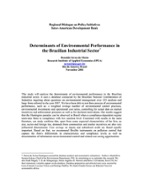Determinants of Environmental Performance in the Brazilian Industrial Sector
Date
Apr 2002
This study will analyze the determinants of environmental performance in the Brazilian industrial sector. It uses a database conducted by the Brazilian National Confederation of Industries inquiring about questions on environmental management over 325 medium and large firms referred to the year 1997. We have been able to test three proxies of environmental performance, such as: a weighted average number of environmental control practices, environmental investments and operational cost ratios, controlling for actual data on market incentives and enforcement pressures as well as for declared motivations. Our results suggest that the Harrington paradox can be observed in Brazil when a compliance-dependent regime motivates firms to compliance with low sanction level. Consistent with results in the main literature, our study confirms that, apart from some expected characteristics of the firm, as size, sector and foreign ties, demands from communities and market incentives are also very influential determinants. Cost savings on inputs and subsidized credit are found equally important. Based on that, we recommend flexible instruments on pollution control that capture the firm¿s differentials in characteristics and compliance levels as well as dissemination of information on environmental control and related cost saving opportunities.




